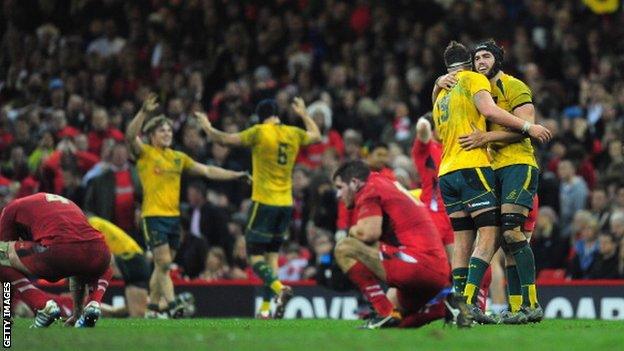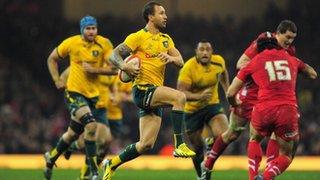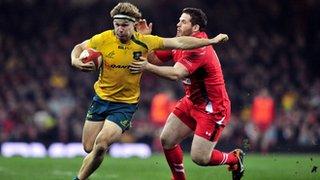Wales, England & Scotland: Rugby's south still trumps north
- Published
- comments

Wales
A rip-roaring contest and magnificent entertainment it may have been, but Welsh faces after yet another defeat by Australia spoke only of more misery and another missed opportunity.
For the Six Nations champions, there were no monkeys removed from backs; no bogeys laid to rest, only the frustratingly familiar, forlorn feeling of further failure.
It was the 18th consecutive time in five years in which Wales were unable to defeat one of the southern powers - half of them against the Wallabies.
They fronted up physically, and their courage, fitness and resilience were not in question. Ultimately though, they lost to a better, smarter, more sophisticated side.
There was something rather unseemly then in the way head coach Warren Gatland highlighted a couple of debatable refereeing decisions - a missed forward pass here, a potential penalty try there - as reasons for a 22nd defeat in 23 Tests on his watch against the former Tri-Nations sides.
"You just need one of those calls to go your way," the hard-bitten New Zealander insisted. "We are knocking at the door at the moment and, at some stage, we are going to knock it over."
But if not now, when? A three-Test series against South Africa next summer? The Springboks' 2013 form - 10 victories and two losses, both to world champions New Zealand, hardly inspires optimism for that assignment. Next year's autumn series? There is little evidence to suggest any of Australia, New Zealand or South Africa will regress significantly over the next 12 months.
So why are Wales and the other home nations made to feel like second-class citizens on the world rugby stage? And what pointers can be taken from this year's autumn series in looking ahead to the Six Nations and the 2015 World Cup?
Southern stars remain a step ahead:
In 14 matches between the Six Nations and Rugby Championship sides in Europe this month, the hosts have won three.
If you take an ailing Argentina out of the equation, Europe's finest have managed one win in 11 Tests against the big three of New Zealand, South Africa and Australia - England's scratchy 20-13 victory over the Wallabies on the opening weekend.
In those 11 matches, the Six Nations sides scored 13 tries between them, the big three rattled up 33. The message is clear: Unless you aspire to score three tries a game, you are unlikely to prevail against the cream of the crop.
Wales competed physically against South Africa and Australia, but were second best in their decision-making, game management and finishing ability. Scotland failed to score a try against either.
France, England and, most memorably, Ireland all threatened to beat New Zealand, but didn't have either the firepower, mastery of basic skills under intense pressure, or self-belief, to close the deal.
Superior skills shine through:
In recent weeks the likes of All Blacks centre Ma'a Nonu, number eight Kieran Read and Wallabies fly-half Quade Cooper have displayed moments of match-winning individual brilliance we rarely see from northern hemisphere players at the highest level.

Cooper's passing and running tormented Wales
Cooper's two stunning, back-of-the-hand offloads to create one try, and very nearly another, against Wales were sublime moments of beauty and bravery amid the brutality of a punishing contest.
"That is just his skill-set," purred Australia captain Ben Mowen. "Not many people can execute that. When he is performing, generally the team is performing."
Cooper's restoration to the Wallaby ranks and rehabilitation under his old Queensland Reds coach Ewen McKenzie is good news for all rugby fans who long for more artists amid the artisans.
Somehow it was fitting that Cooper should fail to execute the more mundane task of popping over a drop-goal from in front of the posts late on that would have taken Australia two scores clear. It was the right option, but his scuffed effort barely got off the ground. Best stick to the maverick genius.
Playing at pace pays off:
This was Australia's 15th Test of the year, their 12th in the last 15 weeks and fifth on successive weekends. More than any top-tier nation, they could have been forgiven a touch of weariness in their final assignment of 2013.
As it was, from the opening seconds of the match, their appetite for a high-tempo, expansive game had Wales scrambling desperately at times in defence.

Hooper's speed was instrumental for Australia
Open-side flanker Michael Hooper was a menace over the ball and over the ground, the first to the breakdown and a vital link to his half-backs, underlined in his pivotal role for the opening Australian try as he stole the ball from Richard Hibbard and popped it up to Will Genia in the same movement.
"They played with a pace and tempo in the first half that put us under pressure," acknowledged Gatland. "That is what you have to cope with when you are playing against these teams."
In the deciding Lions Test last summer, the tourists' scrummaging power wore down the Wallabies pack. Here, the first scrum did not arrive until the 46th minute, and with barely half-a-dozen in all, there was little respite from the attacking onslaught, led by Cooper and the devastating Israel Folau, whose 10th try in his debut season equalled Lote Tuqiri's Australian record in a calendar year.
World Cup ramifications?
Captain Sam Warburton insisted defeat was "not a setback" to Wales' long-term goal of World Cup success, and that getting one over on Australia, who, along with England, they will face in the pool stages in 2015, was "not really the motivation" behind Saturday's game.
"That is a long way away and we still have another autumn series next year," Warburton noted. That may be so but it is difficult to see how Wales can develop the belief to become genuine World Cup contenders if they don't start beating the big three before the next global gathering.
Wales 26-30 Australia: Wallabies triumph in Cardiff thriller
They talked the talk beforehand, insisting the time was ripe to end their miserable sequence against the Wallabies. The points margins - nine, three, six, eight, two, one, two and now four in their last eight encounters - may be small, but the gap in quality remains significant.
The concern is that Australia, despite undergoing a period of transition under new coach Ewen McKenzie, are already re-discovering the best of themselves, particularly with ball in hand.
They may not dominate teams physically, but they remain the smartest of international sides. They bossed the breakdown for the first 50 minutes in Cardiff, and their inventive attacking lines and off-loading game were way beyond anything the hosts could muster.
Six Nations salvation?
Saturday's defeat, a second in four Tests this month after an initial loss to South Africa, took further gloss off what has ostensibly been a good year for Wales, with a successful defence of a Five/Six Nations title for the first time since 1979, and 13 players featuring in a Lions Test series victory.
Warburton, the eternal optimist, suggested Wales had already set themselves a new Six Nations target as a way of channelling the hurt of this latest heartbreaker.
As a keen student of the game's history, he pointed out no country has ever won the championship outright for three years in a row since its inception in 1883.
It is a realistic ambition for this Wales side, with three home games in their 2014 campaign, starting against Italy on 1 February. Trips to Dublin and Twickenham present significant obstacles, but not psychological barriers. Wales have won twice at both venues under Gatland.
But even that potential achievement, significant as it would be, would only serve to highlight what is lacking. Wales may continue to punch their weight at European level but landing a significant blow on the world stage is proving beyond them.
- Published30 November 2013
- Published30 November 2013
- Published23 November 2013
- Published17 November 2013
- Published16 November 2013
- Published16 November 2013
- Published9 November 2013
- Published2 November 2013